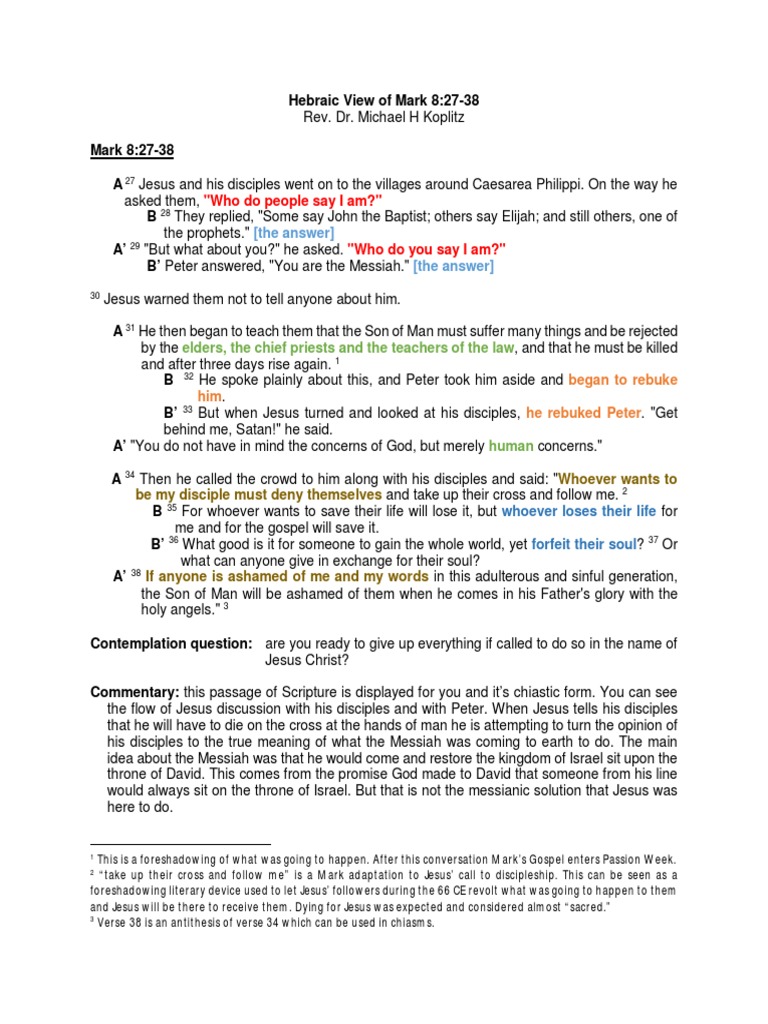In the Gospel of Mark, chapter 8, verses 27 to 38, we encounter a riveting exploration of two pivotal themes: the identity of Jesus Christ and the radical call to discipleship. This segment is not merely a narrative but a profound theological discourse that invites us to ponder significant questions regarding faith, commitment, and the essence of true discipleship. So, what precisely does it mean to follow Christ? Are we prepared to grapple with the implications of this call, particularly in our contemporary society? Let’s delve deeper.
As the passage begins, Jesus poses a seemingly simple question to His disciples, “Who do people say that I am?” This inquiry serves as a catalyst for both self-reflection and dialogue. The answers reflect the swirling opinions of the multitudes: some consider Him John the Baptist; others think He is Elijah or a prophet. Each response encapsulates differing perceptions of Jesus, illustrating the confusion and speculation surrounding His identity. But then, Christ zeroes in on His disciples, asking them directly, “But who do you say that I am?”
This transition from public opinion to personal conviction is crucial. Simon Peter responds, declaring, “You are the Christ.” This acknowledgment is not just a proclamation; it is a recognition of Jesus’ messianic role—a realization of divine identity. Herein lies a challenge for modern readers: are we merely echoing popular beliefs about Jesus, or have we personally wrestled with His identity in our lives? Digging deeply into this question can reveal the depths of one’s faith.
Notably, Jesus’ response to Peter is striking. He instructs His disciples to keep this revelation a secret, highlighting the notion that understanding His identity cannot be confined to mere human interpretation. The messianic revelation requires a heart transformed by divine insight. How often do we, in our zeal, attempt to package our understanding of Christ into neat boxes of theology or tradition? Are we willing to unlearn misconceptions and allow our perspectives to be reshaped?
Following Peter’s emphatic declaration, Jesus begins to outline the path that awaits Him—a trajectory marked by suffering, rejection, and ultimately, death. This foretelling of His passion is a stark contrast to the expectations of a triumphant Messiah. It invites contemplation on the nature of suffering and sacrifice in the life of a believer. A curious challenge arises: how do we reconcile the allure of prosperity and success with the crucible of trials that accompany a life dedicated to Christ?
As the narrative unfolds, Peter’s rebuke of Jesus is equally revealing. He cannot fathom a Messiah who embraces suffering, desiring instead a vision of victory and power. In response, Jesus exclaims, “Get behind me, Satan!”—an astonishing juxtaposition that underscores the tension between earthly priorities and divine purposes. Jesus’ admonition to Peter reverberates through the ages: to set one’s mind on human things rather than on divine plans is to jeopardize the very essence of discipleship.
Herein lies a compelling reflection for each follower of Christ. Are we sometimes more aligned with Peter’s initial fervor, yearning for a worldly affirmation of success, rather than the arduous journey of discipleship? In our rush to experience the overt blessings of faith, do we overlook the necessity of grappling with the arduous challenges inherent in following Christ?
In verses 34 to 38, Jesus articulates the radical nature of discipleship: “If anyone would come after me, let him deny himself and take up his cross and follow me.” This invitation encapsulates Christ’s call to a counter-cultural lifestyle—one that not only embraces sacrifice but also necessitates a daily relinquishing of self. It’s an explicit challenge that transcends the confines of comfort and safety.
The imagery of the cross is profound; it signifies rejection and suffering. This portrayal raises a thought-provoking query: what does it mean to “take up your cross” in the modern context? For many, it may manifest as enduring trials, advocating for justice, or serving the marginalized. It demands an authenticity in faith that mirrors Christ’s relentless love and willingness to endure suffering for the sake of others.
Moreover, Jesus’ assertion that “whoever would save his life will lose it” introduces an intriguing paradox. The quest for self-preservation often yields emptiness when juxtaposed with the profound fulfillment found in surrendering to Christ’s mission. This paradigm shift compels us to examine our own lives: does our pursuit of earthly ambitions overshadow the call to embody Christ’s transformative love in our communities?
As the passage concludes, it echoes an urgent warning about the transient nature of worldly gains. Jesus invites us to consider the eternal ramifications of our choices. The pursuit of fame, wealth, or power ultimately pales in comparison to the joy found in knowing Christ deeply. Are we investing our lives into endeavors that bear eternal significance?
In conclusion, Mark 8:27-38 serves not only as a narrative focal point but as an intricate tapestry of theology that beckons followers of Christ into a comprehensive understanding of discipleship. The interplay between Christ’s identity and the call to bear one’s cross is both challenging and inviting. As we ponder these teachings, may we strive to authentically respond to Jesus’ question: Who do you say that I am? This conversation is foundational, and it embodies the transformative journey of faith that awaits each believer.
